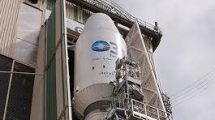 SES has announced the procurement of SES-17, a powerful high throughput satellite to be built by Thales Alenia Space. SES has simultaneously entered into a long-term commercial agreement with Thales to offer FlytLIVE, a new inflight connectivity service over the Americas and the Atlantic Ocean region. SES will operate the satellite infrastructure for FlytLIVE, as well as the complementary ground network.
SES has announced the procurement of SES-17, a powerful high throughput satellite to be built by Thales Alenia Space. SES has simultaneously entered into a long-term commercial agreement with Thales to offer FlytLIVE, a new inflight connectivity service over the Americas and the Atlantic Ocean region. SES will operate the satellite infrastructure for FlytLIVE, as well as the complementary ground network.
The new satellite SES-17, which is expected to be launched in 2020, will operate in geostationary orbit in the Ka frequency band. It will thus complement and strengthen SES´s portfolio of wide- and spot-beam capacity in different frequency bands (Ku and Ka) and orbits (geostationary, GEO, and medium earth orbit, MEO). It will extend SES’s global capabilities for inflight connectivity and deliver high-powered capacity and managed services for data customers over the entire Americas and the Atlantic Ocean.
With the procurement of SES-17, SES has simultaneously entered into a separate commercial agreement with Thales, a leader in inflight entertainment and connectivity for airline passengers over the Americas. As SES-17’s first large anchor customer, Thales will be using the satellite’s next generation high throughput coverage to provide FlytLIVE, a new and next-generation connectivity solution for airlines, with full Internet services, including video streaming, games, social media and live television to passengers traveling over North America, South America, the Caribbean, Mexico, and the Atlantic Ocean. Thales will launch FlytLIVE in 2017, operating it prior to the launch of SES-17 in 2020 on two existing Ka-band multi-beam satellites from SES.
Built on an all-electric version of Thales Alenia Space’s Spacebus NEO platform, SES-17 will weigh more than six metric tons at launch and will offer payload power in excess of 15 kW, with a design life of 15 years. Its highly flexible payload, with close to 200 spot beams of different sizes, will be designed to provide optimal coverage for the densest data corridors in the Americas (North America, the Caribbean, Mexico, Latin America) and over the Atlantic Ocean. The orbital position and the intended launch vehicle have not been disclosed yet.
Having ordered three high-performing GEO satellites – SES-12, SES-14 and SES-15 – to deliver customised mobility services around the world, SES has been making successful inroads into the dynamic and buoyant aeronautical market in the past two years. Thales is the fourth major inflight connectivity provider to ink agreements with SES on its existing and future fleet. SES’s new satellite will also complement its 12 Ka-band satellites operated by O3b Networks in MEO to provide high throughput capacity to other data customers in the enterprise, maritime and government markets.
The procurement of SES-17 is fully compliant with SES’s financial framework and fits within SES’s existing CapEx guidance.
Karim Michel Sabbagh, President and CEO of SES said: “SES-17 is another keystone in our unique satellite architecture and a major milestone in the execution of our strategy to build a differentiated portfolio of high throughput systems for very distinct customer needs. The new satellite will further strengthen our network capabilities to deliver unmatched next generation connectivity services. SES-17 is tailor-made for customers who demand globally flexible, scalable, future-proof and resilient solutions in the aeronautical sector, but also in other demanding data markets. The procurement of SES-17 also illustrates our long-standing relationship with Thales Alenia Space, which has built 12 satellites for O3b and is in the midst of building another eight.”
Patrice Caine, Chairman and CEO of Thales Group said: “Thales works together with its customers to help drive digital transformation across a broad range of sectors; whether it be aviation, ground transportation, aerospace, defence or security. Through this partnership with SES, and by leveraging Thales Alenia Space’s expertise, we are developing a satellite uniquely optimized for the fast moving aviation and mobility market. This will enable us to offer airline customers, a simple and seamless connectivity solution with unmatched performance.”












Add Comment